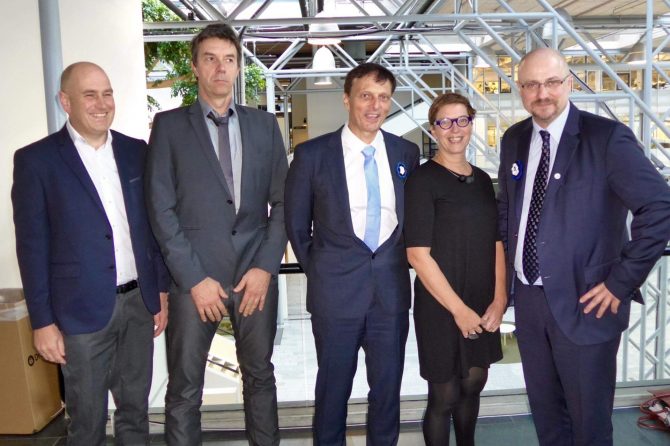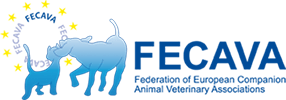
A new FECAVA board elected
A new board (2017-2019) was elected by the Council of the Federation of European Companion Animal Veterinary Associations (FECAVA) on 27 September in Copenhagen. Wolfgang Dohne (UK) is FECAVA’s new president, replacing Jerzy Gawor (Poland), now senior vice president. Incoming board member is Danny Holmes from Ireland. Past president Monique Megens (Netherlands) left the board. The election took place during FECAVA Council meeting at the 23rd EuroCongress in Copenhagen, held jointly with the congresses of the World Small Animal Veterinary Association and the Danish Small Animal Veterinary Association.
“Veterinarians have a key role to play in all animal-assisted interventions.” So said Elizabeth Ormerod of the International Association of Human-Animal Interaction Associations (IAHAIO), guest speaker at FECAVA Council. She urged veterinarians to provide input to ensure the welfare of animals in such interactions – as well as public health. She cited examples of obvious lack of standards, such as close contact between often elderly or immunocompromised people and dogs fed on raw meat and bones, wolf hybrids or pets without rabies vaccination. Boa constrictors, tarantulas were also taken to “visit” residents of nursing homes, she said, while there were even children’s parties organising sleepovers with sloths. “Veterinarians should always be involved – thanks to our combined knowledge of animal health, animal welfare and public health, we are key!”
Senior vice president Monique Megens reported on the expert panel discussion on brachycephalic dogs and the vet’s role, held on 26 September. “We should speak out as vets, and clearly voice our concern about the health and welfare issue of these dogs,” she said. The panel meeting had been a great success, with over 200 people attending and lively discussions. It had led to the adoption of 12 practical recommendations both for vets in practice and the profession as a whole on how to tackle the issue. At European level, these would be taken into account in the position paper on healthy breeding, currently being drafted by Ms Megens on behalf of the joint animal welfare working group of the Federation of Veterinarians of Europe (FVE) and the Union of European Veterinary Practitioners (UEVP).
Nenad Milojkovic (Serbia), chair of the FECAVA working group on canine vector borne diseases, presented an outline of the modules and fact sheets on Leishmania, Dirofilariosis, Borreliosis and Babesiosis, to be produced in the coming months.
Other topics discussed at FECAVA Council included the presentation of a new media concept, the introduction of a student travel scholarship, a 10-point ethical charter and an update of the hygiene posters. Andrew Robinson (FVE) and Thierry Chambon (UEVP) also provided updates of their respective organisations.
During the congress opening ceremony Eric Guagère (France) received the very first Didier Carlotti Award issued by FECAVA, while FECAVA Best Paper awards went to Shailen Jasani (UK) and Viktor Szatmári (Netherlands).
The next EuroCongress will take place in Tallin, from 14-16 June 2018.
Caption: The newly elected FECAVA Board 2017-2019. From left, Danny Holmes (Ireland), Denis Novak (Serbia), Wolfgang Dohne (UK, president), Ann Criel (Belgium), Jerzy Gawor (Poland).
Notes for Editors
- The Federation of European Companion Animal Veterinary Associations (FECAVA) is the platform for the promotion of the professional development and representation of companion animal veterinarians in Europe. Founded in 1990, it currently has 40 national member associations and 13 associate member associations. FECAVA represents over 25,000 companion animal practitioners throughout Europe.
For further information, please contact: Karin de Lange, FECAVA Press officer kdelange@invivo.edu +33 2 99 07 87 10
Leave a reply

Leave a reply